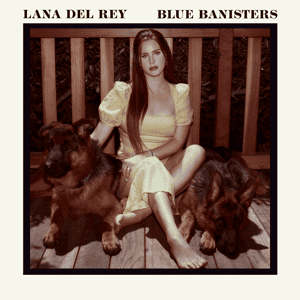Culture Pick | “Blue Banisters” puts Lana Del Rey back in the driver’s seat

November 3, 2021
Over the course of her decade-long career, Lana Del Rey has continuously reinvented her musical persona while pushing the boundaries of pop music. Her eighth studio album and second project released this year, “Blue Banisters,” is the latest affirmation of her musical prowess and further cements her status as one of the most gifted songwriters in modern music.
The album is her most personal work yet. The sweeping Americana and old-money aesthetics of her earlier work are gone, replaced with poetic examinations of her fame and internal conflict over the last several years. Such vulnerability is hardly new for Del Rey, but “Blue Banisters,” feels as if a layer of depersonalization has been removed as she digs deep, putting forth one of her best artistic displays to date.
In a now-deleted Instagram post for the release of the album’s second single, “Arcadia,” Del Rey wrote, “listen to it like you listened to ‘Video Games,’” a reference to her breakout hit from 2011.
“Arcadia” seems to be a similar inflection point in her career, with the song lyrically referencing a rejection of the music industry and media.
Del Rey has maintained a tenuous relationship with the music press since early in her career. From attacking her public image to berating her Saturday Night Live performance in 2012, her personal image, aesthetics and unapologetic personality have made her a lightning rod for controversy.
With the release and widespread acclaim of 2019’s “Norman F—ing Rockwell!,” it appeared she had finally reached her artistic peak, where her accomplishments could no longer be denied by even her most vocal detractors.
However, in the time since, her reputation has taken a massive hit. Her 2020 “Question for the culture” Instagram post drew heavy backlash from both her fans and critics for its awkwardly phrased, racially insensitive criticism of fellow female artists. In early 2021, she again drew her audience’s ire over comments made in an interview regarding Donald Trump.
“Blue Banisters” is to Lana Del Rey what “reputation” was to Taylor Swift: a midcareer turning point focused on retaking ownership of her own public image and artistic legacy.
On the aforementioned “Arcadia,” Del Rey sings, “They built me up 300 feet tall just to tear me down, so I’m leavin’ with nothing but laughter, and this town.” This line, a clear reference to the public perception of her artistry, defines this central theme of the project.
The album’s clear standout is “Black Bathing Suit,” a five-minute track that examines and recontextualizes the persistent subjects in her discography: America, fame, family, love and heartbreak. The song’s first verse strips away the typical grand scenery Del Rey tends to indulge in, instead presenting images of Zoom calls, Target parking lots and watching TV on the couch. The track is deeply personal, touching on her recent weight gain, her relationship with her mother and the fallout over the “Question for the culture” post.
Throughout the song, she laments the public and media’s perception of her, longing for them to truly see the angelic nature of her voice and her heart, singing, “I guess I’m complicated, my life’s sorta, too, I wish you could see to my soul through this black bathing suit.”
The track is one of the most Lana-esque she has ever released. Her dense poetic songwriting ability is at its peak on this project, as she hits an artistic high point over a decade into her music career.
While “Blue Banisters” is unlikely to have the sales or popularity of her earlier projects, it is above all else a statement piece that, despite the controversies and behind-the-scenes antics, shows that the creative force that lifted Del Rey to her initial stardom is still present.
The project has put the power back in Del Rey’s hands to redefine and shape her career, to pursue her artistic aspirations in as pure a way possible. In the lead-up to the album’s release, she deactivated her social media, an apparent effort to allow her artistic offering to speak for itself.
Del Rey, it seems, is attempting to liberate herself from the toxic media cycle of controversy that has plagued her career from its onset. The burdens placed on female artists by the industry and media often punish women who pursue an aggressively unique artistic vision and have certainly placed a heavy burden on Del Rey throughout her career. Despite those obstacles, “Blue Banisters” places Del Rey back in the driver’s seat, in control of her future output by her own design.
Questions? Email the Culture desk at culture@thecrimsonwhite.com.







